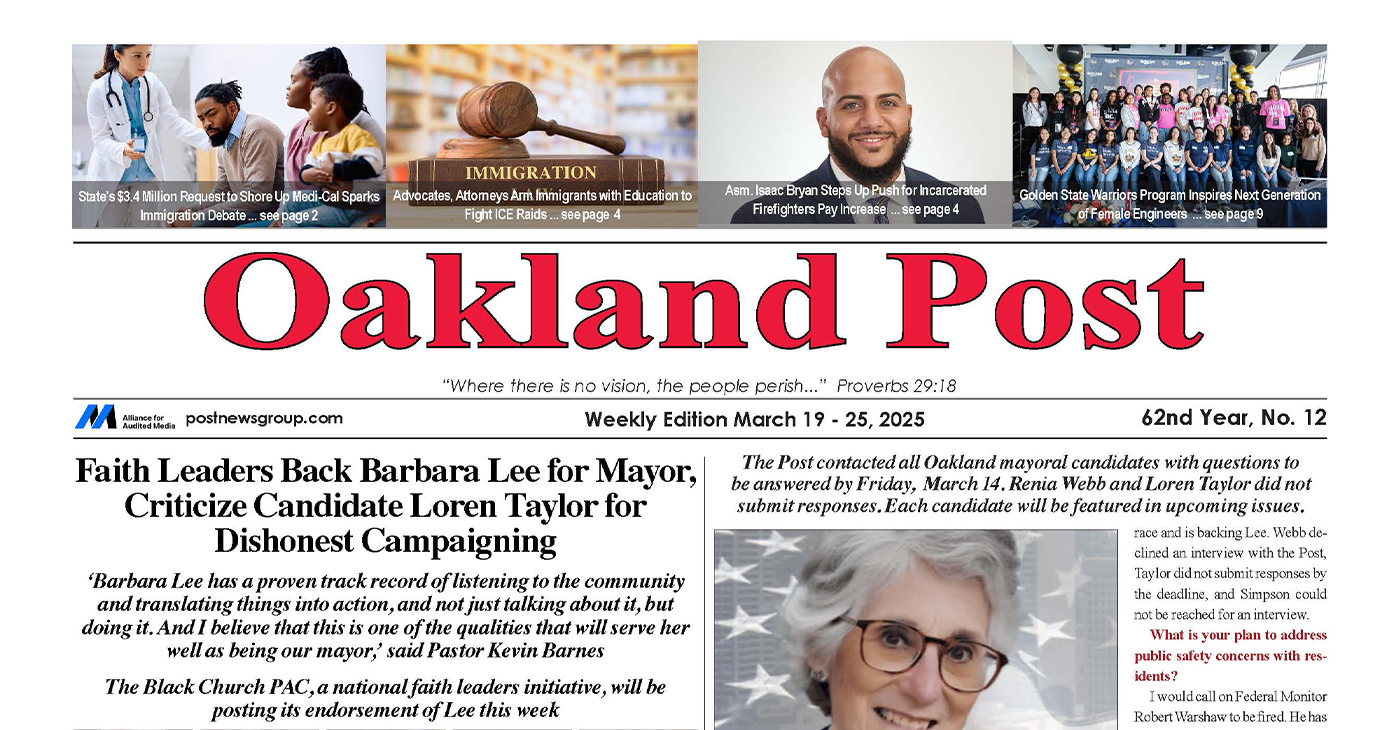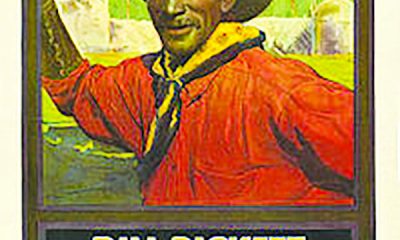Entertainment
Bill Pickett Rodeo Founder Dies At 76

Lu Vason, the founder and producer of 31 year old Bill Pickett Invitational Rodeo (Courtesy of The Chicago Defender)
Lu Vason: Visionary and Producer
Special to the NNPA from The Chicago Defender
Best known for the Bill Pickett Invitational Rodeo, founder and producer Lu Vason who grew up in Berkeley, California. He moved to Denver in 1977. Vason, who lived in Aurora and had just turned 76, died early Sunday of a heart condition, said Les Franklin, a close friend of Vason’s and the founder of the Shaka Franklin Foundation for Youth.
Like many successful people Lu Vason had a varied life, with each experience leading him to his destiny. He had established himself as an innovative leader in special events marketing. had over 40 years experience as a producer, media impresario and marketing consultant.
Before Vason got into show business, he was a beautician and barber. When he began a career as a promoter and producer, the legendary rock music promoter Barry Fey became his mentor.
Lu Vason, promoted musical artists and is credited with creating the Pointers Sisters and managing various other artists. He formed Aries Concerts and the Jazz Lives Series promoting various concerts and concert tours. He promoted performances by stars like Prince and Stevie Wonder.
Eventually, he realized that the music industry was being taken over by bigger corporations with deeper pockets and he couldn’t compete with that.
He continued to promote smaller concerts, and was working until shortly before he died.
In 1977, during Wyoming’s Cheyenne Frontier Days, Vason’s interest turned toward rodeo. His curiosity was inspired when he noted that there were no Black cowboys participating that day. He then Were people aware of the role that the Black cowboy had played in this country’s history?
At the Black American West Museum, in Denver, Vason learned of Bill Pickett, a black cowboy who created “bulldogging,” now called steer wrestling, according to the rodeo website. Pickett would ride alongside a steer, jump on its shoulders and bring the animal down by digging in his heels.
Lu Vason was convinced that the time had come to uncover the cultural past of the Black cowboy. In 1984, he created an all Black rodeo named after legendary Black cowboy, Bill Pickett, who originated “bulldogging”. Some 25 years later the Bill Pickett Invitational Rodeo is now a popular series, which reaches over 130,000 spectators annually across the United States..
“People knew the name, Will Rogers, but who they hadn’t heard of was Bill Pickett, and if they had, they didn’t know he was Black,” Vason said, according to the website.
The first Bill Pickett Invitational was held in 1984 in Denver.
“Lu was an incredible creative conceptionalist and organizer. The Bill Pickett Rodeo is proof of his vision to see what is sustainable and far reaching. His legacy will continue through the Bill Pickett Rodeo,” said Margo LaDrew, LaDrew & Associates who worked as a consultant for over 20 years with Mr. Vason.
Committed to the black community, especially to helping black youngsters, Vason was always around youth and children making a difference.
On Sunday, Vason’s Facebook page was filled with condolences and tributes from friends.
A funeral service is set for Friday at Shorter Community AME Church in Denver at 11:30 a.m.
Activism
Oakland Post: Week of March 19 – 25, 2025
The printed Weekly Edition of the Oakland Post: Week of March 19 – 25, 2025

To enlarge your view of this issue, use the slider, magnifying glass icon or full page icon in the lower right corner of the browser window.
Activism
Oakland Post: Week of March 12 – 18, 2025
The printed Weekly Edition of the Oakland Post: Week of March 12 – 18, 2025

To enlarge your view of this issue, use the slider, magnifying glass icon or full page icon in the lower right corner of the browser window.
Activism
Oakland Post: Week of March 5 – 11, 2025
The printed Weekly Edition of the Oakland Post: Week of March 5 – 11, 2025

To enlarge your view of this issue, use the slider, magnifying glass icon or full page icon in the lower right corner of the browser window.
-

 #NNPA BlackPress3 weeks ago
#NNPA BlackPress3 weeks agoTarget Takes a Hit: $12.4 Billion Wiped Out as Boycotts Grow
-

 Activism3 weeks ago
Activism3 weeks agoUndocumented Workers Are Struggling to Feed Themselves. Slashed Budgets and New Immigration Policies Bring Fresh Challenges
-

 #NNPA BlackPress3 weeks ago
#NNPA BlackPress3 weeks agoBREAKING Groundbreaking Singer Angie Stone Dies in Car Accident at 63
-

 Activism4 weeks ago
Activism4 weeks agoOakland Post: Week of February 26 – March 4, 2025
-

 #NNPA BlackPress3 weeks ago
#NNPA BlackPress3 weeks agoNAACP Legend and Freedom Fighter Hazel Dukes Passes
-

 #NNPA BlackPress4 weeks ago
#NNPA BlackPress4 weeks agoApple Shareholders Reject Effort to Dismantle DEI Initiatives, Approve $500 Billion U.S. Investment Plan
-

 Arts and Culture3 weeks ago
Arts and Culture3 weeks agoBeverly Lorraine Greene: A Pioneering Architect and Symbol of Possibility and Progress
-

 #NNPA BlackPress4 weeks ago
#NNPA BlackPress4 weeks agoTrump Kicks the Ukrainian President Out of the White House
Entertainment
Bill Pickett Rodeo Founder Dies At 76

Lu Vason, the founder and producer of 31 year old Bill Pickett Invitational Rodeo (Courtesy of The Chicago Defender)
Lu Vason: Visionary and Producer
Special to the NNPA from The Chicago Defender
Best known for the Bill Pickett Invitational Rodeo, founder and producer Lu Vason who grew up in Berkeley, California. He moved to Denver in 1977. Vason, who lived in Aurora and had just turned 76, died early Sunday of a heart condition, said Les Franklin, a close friend of Vason’s and the founder of the Shaka Franklin Foundation for Youth.
Like many successful people Lu Vason had a varied life, with each experience leading him to his destiny. He had established himself as an innovative leader in special events marketing. had over 40 years experience as a producer, media impresario and marketing consultant.
Before Vason got into show business, he was a beautician and barber. When he began a career as a promoter and producer, the legendary rock music promoter Barry Fey became his mentor.
Lu Vason, promoted musical artists and is credited with creating the Pointers Sisters and managing various other artists. He formed Aries Concerts and the Jazz Lives Series promoting various concerts and concert tours. He promoted performances by stars like Prince and Stevie Wonder.
Eventually, he realized that the music industry was being taken over by bigger corporations with deeper pockets and he couldn’t compete with that.
He continued to promote smaller concerts, and was working until shortly before he died.
In 1977, during Wyoming’s Cheyenne Frontier Days, Vason’s interest turned toward rodeo. His curiosity was inspired when he noted that there were no Black cowboys participating that day. He then Were people aware of the role that the Black cowboy had played in this country’s history?
At the Black American West Museum, in Denver, Vason learned of Bill Pickett, a black cowboy who created “bulldogging,” now called steer wrestling, according to the rodeo website. Pickett would ride alongside a steer, jump on its shoulders and bring the animal down by digging in his heels.
Lu Vason was convinced that the time had come to uncover the cultural past of the Black cowboy. In 1984, he created an all Black rodeo named after legendary Black cowboy, Bill Pickett, who originated “bulldogging”. Some 25 years later the Bill Pickett Invitational Rodeo is now a popular series, which reaches over 130,000 spectators annually across the United States..
“People knew the name, Will Rogers, but who they hadn’t heard of was Bill Pickett, and if they had, they didn’t know he was Black,” Vason said, according to the website.
The first Bill Pickett Invitational was held in 1984 in Denver.
“Lu was an incredible creative conceptionalist and organizer. The Bill Pickett Rodeo is proof of his vision to see what is sustainable and far reaching. His legacy will continue through the Bill Pickett Rodeo,” said Margo LaDrew, LaDrew & Associates who worked as a consultant for over 20 years with Mr. Vason.
Committed to the black community, especially to helping black youngsters, Vason was always around youth and children making a difference.
On Sunday, Vason’s Facebook page was filled with condolences and tributes from friends.
A funeral service is set for Friday at Shorter Community AME Church in Denver at 11:30 a.m.
Activism
Oakland Post: Week of March 19 – 25, 2025
The printed Weekly Edition of the Oakland Post: Week of March 19 – 25, 2025

To enlarge your view of this issue, use the slider, magnifying glass icon or full page icon in the lower right corner of the browser window.
Activism
Oakland Post: Week of March 12 – 18, 2025
The printed Weekly Edition of the Oakland Post: Week of March 12 – 18, 2025

To enlarge your view of this issue, use the slider, magnifying glass icon or full page icon in the lower right corner of the browser window.
Activism
Oakland Post: Week of March 5 – 11, 2025
The printed Weekly Edition of the Oakland Post: Week of March 5 – 11, 2025

To enlarge your view of this issue, use the slider, magnifying glass icon or full page icon in the lower right corner of the browser window.
-

 #NNPA BlackPress3 weeks ago
#NNPA BlackPress3 weeks agoTarget Takes a Hit: $12.4 Billion Wiped Out as Boycotts Grow
-

 Activism3 weeks ago
Activism3 weeks agoUndocumented Workers Are Struggling to Feed Themselves. Slashed Budgets and New Immigration Policies Bring Fresh Challenges
-

 #NNPA BlackPress3 weeks ago
#NNPA BlackPress3 weeks agoBREAKING Groundbreaking Singer Angie Stone Dies in Car Accident at 63
-

 Activism4 weeks ago
Activism4 weeks agoOakland Post: Week of February 26 – March 4, 2025
-

 #NNPA BlackPress3 weeks ago
#NNPA BlackPress3 weeks agoNAACP Legend and Freedom Fighter Hazel Dukes Passes
-

 #NNPA BlackPress4 weeks ago
#NNPA BlackPress4 weeks agoApple Shareholders Reject Effort to Dismantle DEI Initiatives, Approve $500 Billion U.S. Investment Plan
-

 Arts and Culture3 weeks ago
Arts and Culture3 weeks agoBeverly Lorraine Greene: A Pioneering Architect and Symbol of Possibility and Progress
-

 #NNPA BlackPress4 weeks ago
#NNPA BlackPress4 weeks agoTrump Kicks the Ukrainian President Out of the White House















































Leave a Reply